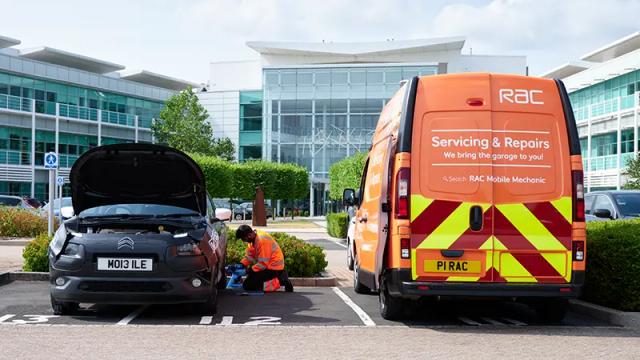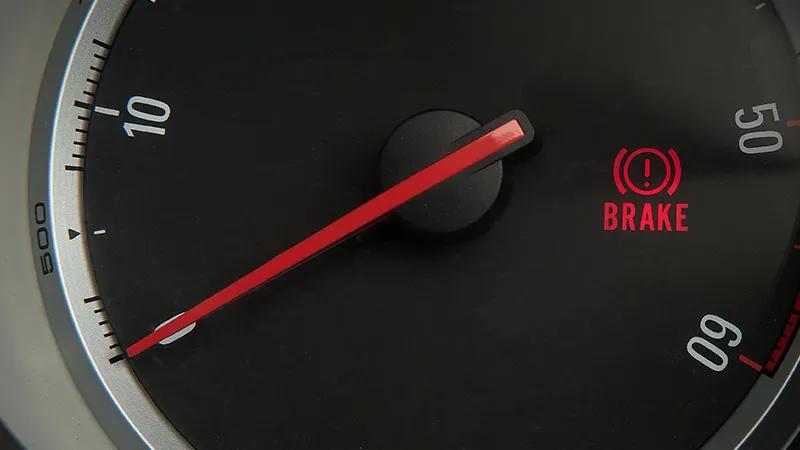Trustpilot rating for all RAC Mobile Mechanics.
Why choose the RAC for a brake repair?
At the RAC, we've got over 125 years' experience helping UK drivers. We have the skills and knowledge to keep your vehicle running.
Plus, with RAC Mobile Mechanics, you can avoid the hassle of taking your vehicle to a garage when you need a repair. We’ll come to you, at your home or work.

Our top pick
RAC Mobile Mechanic

At the RAC, we’ve got over 125 years’ experience in offering complete peace of mind™ to our members. We’re best known for our breakdown service. And now – our new RAC Mobile Mechanics are here to help make every day motoring more convenient and easier. If you need a service or repair, they’ll come to you at your home or work.

Book a brake repair
Brakes are essential to staying safe on the road, so keeping them in top condition is crucial. In this article we’re going to run through the different parts of a brake system.

Vehicle diagnostic check
£99
We’ll spend up to 30 mins checking our car’s onboard management system for faults. We’ll talk you through repairs needed and provide a full report. If any further work is needed, we’ll agree this with you before we start. Any additional work after the first 30 minutes will be priced at £20 per 15 minutes. We’ll agree this with you before proceeding.
Average cost of a brake repair by car make^
The cost to repair your brakes will depend on the car you drive. According to RAC data, the average cost to repair your brakes is £329. But you can check out the average price of a brake repair for your specific car make here.
Car make | Average price |
£267 | |
£271 | |
£289 | |
£281 | |
£271 | |
£324 | |
£236 | |
£257 | |
£267 | |
£348 |
^Average price quoted for brake repairs by RAC Mobile Mechanics from 01/01/25 to 31/03/25.
Average cost of a brake repair by location^
Below you’ll find the average price for a brake repair for a range of popular locations. With our mobile mechanics, the price we quote includes parts, labour and VAT. And you can spread the cost with Klarna1. Remember, if you get a quote from a garage, the price quoted may vary depending on labour rates, parts, and other factors.
Location | Average price |
£287 | |
£271 | |
£277 | |
£297 | |
£290 | |
£279 | |
£277 | |
£264 | |
£256 | |
Tonbridge (Maidstone) | £310 |
^Average price quoted for brake repairs by RAC Mobile Mechanics from 01/01/25 to 31/03/25.
Content Guide
Servicing your brakes
Brakes are essential to staying safe on the road, so keeping them in top condition is crucial. In this article we’re going to run through the different parts of a brake system.
We’ll touch on the warning signs that your brakes may need servicing, and the give you the basics on how to do brake fluid changes and checks.
Types of brakes: understanding your brake system
Most modern cars either have disc brakes on all wheels, or disc brakes in the front and drum brakes in the rear. The key parts of a disc brake system include:
- Brake discs: these connect to each wheel. When you press on the brake pedal, the brake pads grip the discs to slow the car down. They wear down over time and need regular checking to make sure they’re still in performing well.
- Brake pads: these create friction by pressing against the brake discs to stop the car. Brake pads wear down faster than other parts of the braking system, so it’s essential to replace them as needed.
- Brake calipers: these hold the brake pads and use hydraulic pressure to push them against the brake discs. They will also need regular checking for wear and damage.
- Brake lines: these are the tubes that carry brake fluid, providing the pressure to operate your brakes. Any leaks or damage to brake lines can cause your brakes to fail, so regular inspections are essential.
Top warning signs that your brakes need attention
Keeping an eye out for these warning signs. Early intervention can help you catch brake issues before they become dangerous:
- Squeaking or grinding noises: these sounds might mean that your brake pads are worn or that there’s debris in the brake system. If your brakes are squeaking but you’ve recently had them replaced, it’s likely to just be a symptom of them ‘bedding in’.
- Vibrating or pulsing: if your car vibrates when braking, one possible reason is that your brake discs are warped or uneven.
- Soft or spongy brake pedal: this could signal air in the brake lines or a brake fluid leak, both of which need attention.
- Car pulling to one side: if your car pulls to one side while braking, there could be a stuck caliper, or it could be a sign of uneven brake pad wear.
- Brake warning light: if this light comes on, it could mean low brake fluid or there could be another issue that needs a professional check.
Servicing your brakes
Brake servicing involves inspecting, cleaning, and replacing parts if needed. Here’s what a typical brake service may include:
- Brake pad replacement: brake pads deal with a lot of wear-and-tear. You may need to replace them every 25,000 to 70,000 miles, depending on your driving habits.
- Brake disc resurfacing or replacement: if your discs are uneven, they can be resurfaced (smoothed out). Badly worn or damaged discs should be replaced.
- Caliper service: checking and cleaning brake calipers can prevent them from sticking and ensure even braking. Damaged calipers need replacing.
- Brake line inspection: a technician will check for any leaks, cracks, or wear. If your brake lines are damaged this can be a huge safety hazard. You’ll need to have them seen by a professional as soon as possible.
Brake fluid changes
Brake fluid is essential for hydraulic braking systems. Over time, it absorbs moisture, which can reduce braking performance. Most manufacturers recommend changing brake fluid every two years, or at around 20,000 miles.
During a brake fluid change, a technician will:
- Remove old fluid and any air from the brake lines.
- Refill the system with fresh fluid.
- Test the system to ensure proper pressure and responsiveness.
Brake checks
Having your brakes checked regularly can help nip small problems in the bud and prevent them from becoming bigger issues down the line. During a brake check, the following are usually examined:
- Brake pads and discs: a technician will check for wear, thickness, and any signs of damage.
- Brake fluid level and condition: they’ll ensure the fluid level is correct and that it’s clear, not discoloured.
- Brake lines and hoses: these will be checked for leaks, cracks, or other damage.
- Handbrake (if applicable): the handbrake is tested to ensure it’s holding the vehicle securely.
Staying on top of brake servicing and checks is a key part of car maintenance. If you notice any warning signs or if you haven’t had your brakes checked in a while, it’s a good idea to book a professional brake inspection. This helps keep you safe on the road and can prevent costly repairs down the line.
Browse other top locations and makes across our network in the UK
Filter by

